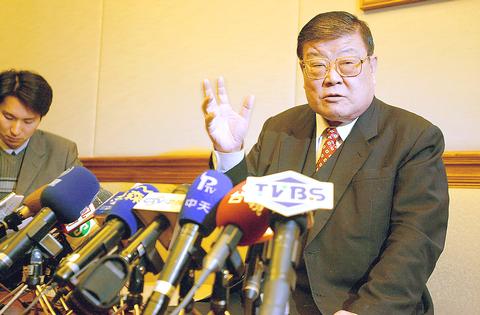KMT lawmaker Liao Hwu-peng (廖福本) was indicted yesterday for allegedly trying to coerce executives to sell fake stocks in the Chi Mei Optoelectronics Corp (奇美電子). Prosecutors are demanding he serve seven years in prison if found guilty.
Tainan District Prosecutor Chao Chung-yueh (
According to the Tainan District prosecutor, Liao called Chi Mei Electronics nine times last year and demanded that the company sell him shares at discount prices. But Chi Mei Optoelectronics Corp rejected Liao's request.

PHOTO: CHEN CHENG-CHANG, TAIPEI TIMES
Liao, 62, a six-term opposition legislator from Yunlin County, said he was innocent.
Liao questioned how the prosecutors could indict him when they had failed to find fake shares during a raid of his apartment, located in the Ta-an Complex, a government-owned residence for legislators, on Aug. 16 last year.
Another search of Liao's office in the Legislative Yuan last year was prohibited by speaker Wang Jing-pyng (
Meanwhile, Taipei District Prosecutor Liu Cheng-wu (
Liu said Liao was found to have changed the date of more than 30 bills illegally.
The total value of the checks is more than NT$300,000. But Liao claimed that his assistant had changed the dates at the request of the Bank of Taiwan.
To avoid accusations of violating legislators' rights, prosecutor Liu said he would question Liao on Feb.19, the eve of the new legislative session, which opens on Feb. 20.
Liao said he is suffering from an injured leg and can't be present at that time.
In addition to these two cases, prosecutors are also investigating whether Liao was involved in insider trading of certain stocks.
Liao said in a press conference yesterday at the Legislative Yuan that his friend had warned him that he might be in trouble after the DPP took power. He did not explain further, but said "now the words of my friend are unfortunately coming true."
Asked whether Liao had been a special target of the Ministry of Justice, justice minister Chen Ding-nan (陳定南) said yesterday that the ministry will do its best to crack down on all illegal activities, but will not get involved in any particular case as long there is sufficient evidence to prove the crime.Chen said government action to crack down on "black gold" would not change from one party or person to another.

DAREDEVIL: Honnold said it had always been a dream of his to climb Taipei 101, while a Netflix producer said the skyscraper was ‘a real icon of this country’ US climber Alex Honnold yesterday took on Taiwan’s tallest building, becoming the first person to scale Taipei 101 without a rope, harness or safety net. Hundreds of spectators gathered at the base of the 101-story skyscraper to watch Honnold, 40, embark on his daredevil feat, which was also broadcast live on Netflix. Dressed in a red T-shirt and yellow custom-made climbing shoes, Honnold swiftly moved up the southeast face of the glass and steel building. At one point, he stepped onto a platform midway up to wave down at fans and onlookers who were taking photos. People watching from inside

A Vietnamese migrant worker yesterday won NT$12 million (US$379,627) on a Lunar New Year scratch card in Kaohsiung as part of Taiwan Lottery Co’s (台灣彩券) “NT$12 Million Grand Fortune” (1200萬大吉利) game. The man was the first top-prize winner of the new game launched on Jan. 6 to mark the Lunar New Year. Three Vietnamese migrant workers visited a Taiwan Lottery shop on Xinyue Street in Kaohsiung’s Gangshan District (崗山), a store representative said. The player bought multiple tickets and, after winning nothing, held the final lottery ticket in one hand and rubbed the store’s statue of the Maitreya Buddha’s belly with the other,

‘NATO-PLUS’: ‘Our strategic partners in the Indo-Pacific are facing increasing aggression by the Chinese Communist Party,’ US Representative Rob Wittman said The US House of Representatives on Monday released its version of the Consolidated Appropriations Act, which includes US$1.15 billion to support security cooperation with Taiwan. The omnibus act, covering US$1.2 trillion of spending, allocates US$1 billion for the Taiwan Security Cooperation Initiative, as well as US$150 million for the replacement of defense articles and reimbursement of defense services provided to Taiwan. The fund allocations were based on the US National Defense Authorization Act for fiscal 2026 that was passed by the US Congress last month and authorized up to US$1 billion to the US Defense Security Cooperation Agency in support of the

‘COMMITTED TO DETERRENCE’: Washington would stand by its allies, but it can only help as much as countries help themselves, Raymond Greene said The US is committed to deterrence in the first island chain, but it should not bear the burden alone, as “freedom is not free,” American Institute in Taiwan Director Raymond Greene said in a speech at the Institute for National Defense and Security Research’s “Strengthening Resilience: Defense as the Engine of Development” seminar in Taipei yesterday. In the speech, titled “Investing Together and a Secure and Prosperous Future,” Greene highlighted the contributions of US President Donald Trump’s administration to Taiwan’s defense efforts, including the establishment of supply chains for drones and autonomous systems, offers of security assistance and the expansion of